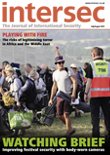International Threat Watch 2015
Regional Instability
Paul McGrath assesses the potential sources of regional instability in 2015
South Asia
ISAF withdrawal from Afghanistan
A civil war is very likely after the 2014 ISAF withdrawal. Although the Taliban is unlikely to be able to overthrow the Kabul government, at least over the next two years, the government’s authority outside the capital will probably erode as the Taliban and local warlords gain greater control over their local regions, particularly in the south and east. The coalition government put in place following the contentious and disputed elections in 2014 is inherently unstable. The Ghani and Abdullah factions are divided along ethnic lines, with Ghani drawing the bulk of his support from the Pashtun south and Abdullah popular among Tajiks and in former Northern Alliance territories. This will further disrupt the Kabul government’s efforts to exert its writ in the country. The central government already has difficulties in doing this in Taliban-controlled areas in the south and east, but a breakup of the new coalition would also increase the risk of Abdullah supporters exerting their influence in their strongholds, such as Nuristan.
The ISAF withdrawal will also free up battle-hardened militants from Afghanistan to travel to Pakistan and India. The Islamic State (IS) is looking to carve a niche for itself by attempting to win the support of local Taliban commanders. And core al-Qaeda is fighting to stay relevant and maintain its status among South Asian jihadist groups, in light of the disruption and losses suffered by its benefactors, the Tehrik-e-Taliban Pakistan (TTP) in the ongoing military operation in North Waziristan. Splintering within the TTP will force jihadist groups to refocus their efforts on India, with even al-Qaeda pandering to the interests of local Kashmiri and Sunni sectarian groups in a bid to stay relevant.
Southeast Asia
Thailand’s military coup
Since taking power on 22 May 2014, the Thai military government has restored order following months of anti-government protests in Bangkok. But the steps subsequently taken by the government of Prime Minister General Prayuth Chan-ocha indicate it is unlikely the military intends to fashion a political solution that would be acceptable to supporters of former Prime Minister Thaksin Shinawatra. Pro-Thaksin police officers have been transferred out of key positions, along with provincial governors from Thaksin strongholds. The ruling National Council for Peace and Order (NCPO) has also introduced an interim constitution solidifying its control over the executive and the legislature. These steps suggest that, beyond the one-year outlook, the risk of further protests will increase, particularly in north and northeast Thailand where Thaksin is popular.
There has been no public criticism of the coup by other Southeast Asian countries. However, General Prayuth’s labour policy has led to criticisms from neighbouring Cambodia. In June, he announced there would be tighter restrictions on around three million foreign workers from Myanmar, Laos and Cambodia. Fearing a crackdown, around 220,000 Cambodian migrant workers returned home. Cambodia’s Deputy Prime Minister and Interior Minister Sar Kheng on 17 June criticised the Thai military for not informing or consulting his government prior to the announcement. Thai-Cambodian relations have typically been weaker under Thailand’s pro-royalist governments. Relations deteriorated during Abhisit Vejjajiva’s premiership in 2008. In November 2009, Thailand terminated the 2001 Memorandum of Understanding on Thailand-Cambodia Overlapping Claims Area (OCA) in the Gulf of Thailand over Thaksin’s role as economic advisor to Cambodia’s Prime Minister, Hun Sen.
During his two-day visit to Cambodia in October, Prayuth did not discuss the OCA despite Cambodia’s desire to accelerate negotiations on joint exploration. Although relations are unlikely to deteriorate to a large-scale military confrontation, negotiations for joint development of energy resources in the Gulf of Thailand are unlikely with the Thai military in power. It has not secured popular nationwide support for the coup, and it is unlikely to embark on negotiations that would spark nationalist opposition while it consolidates control over the country.
West Africa
The Ebola threat
The outbreak of the Ebola Virus Disease (EVD, or Ebola) in Guinea, Liberia and Sierra Leone (the three worst-affected countries in West Africa) has been the largest epidemic in West Africa in terms of geographic coverage and death toll in recent times. Efforts to contain the outbreak have been undermined by low public confidence in the governments’ handling of the outbreak, including use of the military in quarantined communities. The spread of the virus is increasingly straining the social fabric of these countries, as well as heightening their political and economic fragility. The Ebola outbreak has caused considerable disruption for business travel and operations in Guinea, Liberia and Sierra Leone. Mining operations in these countries, a key revenue earner for their governments, have stalled. The International Monetary Fund (IMF) has further revised downwards the projected economic growth of these countries, with Liberia’s projected growth reduced to 2.6 percent for 2014.
According to the World Bank, these countries stand to jointly lose up to US$1bn in 2015 if the virus is not contained. The tourism sector in Africa as a whole will be badly affected, even in unaffected countries. A World Bank report published in October highlighted that Gambia, a country without any cases of Ebola, has reported a cancellation of 65 per cent of hotel bookings for the 2014-15 tourist season, while South Africa has also reported a number of cancellations since the beginning of the outbreak.
Containing the outbreak will require a long-term, robust international response and support including the rapid scaling up of isolation facilities. International personnel – in particular health workers and security personnel – will be exposed to elevated risks of aggravated robbery, harassment by locals, and collateral injury during sporadic protests, particularly in capital cities or areas affected by quarantine, against government actions and the rising cost of living.
Paul McGrath is Director of Violent Risk at IHS Country Risk









